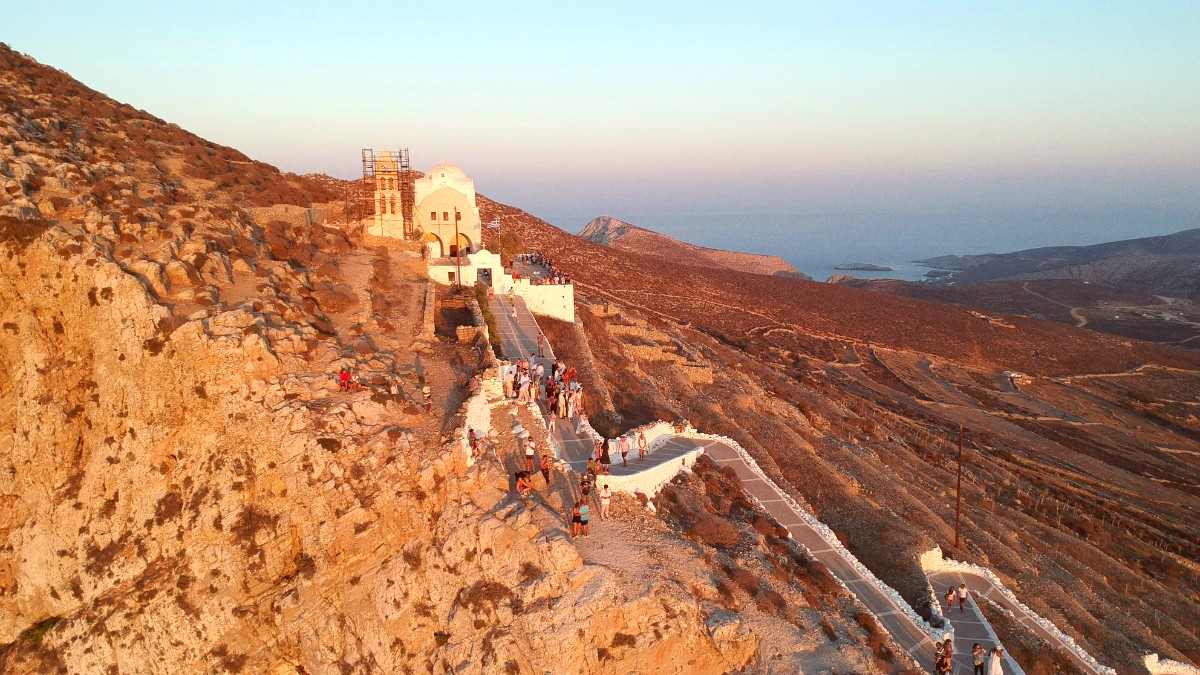
Greece
Main mobile providers in Greece are Cosmote, Vodafone, and Wind. All sell prepaid SIM cards for tourists with data and call packages. Purchase them at Athens Airport or local shops in Katapola, Aegiali, or Chora. Bring your passport for registration. Wi-Fi is widely available and usually free in hotels, guesthouses, cafes, and restaurants.
The official language is Greek. Most people working in tourism speak English. In smaller villages or with older locals, English may be limited. ELTA (Hellenic Post) has offices in Katapola and Chora for sending postcards or parcels.
For consistent internet access, especially off the beaten path, a portable Wi-Fi device can be a good option. Mobile data coverage is generally good in populated areas but can be spotty on remote hiking trails or very secluded beaches.
While English is common in tourist areas, a few Greek phrases are always appreciated by locals.
Generally open Monday to Saturday. Many follow a split schedule, opening in the morning (e.g., 9 AM - 2 PM) and reopening in the evening (e.g., 5 PM - 9 PM) after a siesta. Tourist shops may have longer, continuous hours in high season.
Lunch service typically runs from 1 PM to 3:30 PM. Dinner service starts from 7 PM and extends until midnight or later. Many close for an hour or two in the late afternoon. Cafes open from early morning until late evening.
Banks typically open Monday to Friday, from 8:00 AM to 2:00 PM. ATMs are available 24/7 in Chora, Katapola, and Aegiali.
Public holidays (e.g., Greek Independence Day, May Day, Assumption of Mary) and religious holidays (especially Orthodox Easter, Christmas, Assumption of Mary) can lead to closures of banks, government offices, and some shops. Ferries usually operate but may have revised schedules.
Many tourist-oriented businesses, including hotels, restaurants, shops, and rental agencies, close for the low season, roughly from November to March or April. Ferry schedules are also significantly reduced during this period.
Business hours on Amorgos adapt to local rhythms and seasonal changes. Adjust your plans accordingly, especially outside of peak summer.
Shake hands when meeting someone for the first time. For close friends, a kiss on each cheek is common. Use "Yiasas" (formal or plural) or "Yiasou" (informal or singular) for greetings. Casual attire is generally acceptable. Modest dress, with covered shoulders and knees, is standard when visiting churches and monasteries. Swimwear is for beaches only, not for walking around towns.
Tipping is customary but not mandatory. Sharing dishes is common. Do not rush your meal; dining is a social activity.
It is generally fine to photograph landscapes, towns, and public spaces. Always ask permission before taking close-up photos of individuals, especially children. Inside churches and monasteries, ask permission or observe signs regarding photography. Flash photography is often prohibited. Avoid overtly discussing politics or the Greek financial crisis unless locals initiate the conversation. Do not make direct comparisons between Greece and Turkey in a negative light. Public displays of excessive affection are generally frowned upon, especially outside tourist areas.
Greece is generally welcoming. Amorgos is a laid-back island. Public displays of affection for same-sex couples are becoming more accepted in major cities and tourist areas but may still gather some stares in very traditional, remote villages. Overall, Amorgos is considered a safe and tolerant destination.
Embracing local customs and being aware of cultural refinements enriches your experience and shows respect for the island and its people.
Greece uses the Euro (€). Credit and debit cards are widely accepted in most hotels, restaurants, and larger shops. However, smaller tavernas, local shops, and remote areas may prefer cash. It is always wise to carry some cash for smaller purchases and unforeseen circumstances.
ATMs are available in Chora, Katapola, and Aegiali. It's advisable to use ATMs associated with banks to avoid high fees. Currency exchange services are limited on the island; it is best to exchange currency before arriving in Amorgos or at major banks in Athens.
Banks on Amorgos typically open Monday to Friday, from 8:00 AM to 2:00 PM. They are closed on weekends and public holidays. It is a good idea to complete any banking needs within these hours.
Amorgos can be a relatively affordable destination compared to more popular Cycladic islands, especially if you plan your spending wisely. Eating at local tavernas, using public transport, and enjoying free activities like hiking can stretch your budget further.
Major cards are common, but cash is preferred by smaller vendors.
Found in main towns, bank ATMs are generally more advantageous.
Limited on the island, it is best to plan currency exchange in advance.
Always carry a mix of payment methods and some cash for smooth transactions across the island.